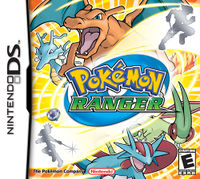From NintendoWiki, your source on Nintendo information. By fans, for fans.
| Pokémon Ranger
|
| ポケモンレンジャー
|

Boxart of Pokémon Ranger
|
|
|
|
| N. America:
|
October 30, 2006
|
| Japan:
|
March 23, 2006
|
| Europe:
|
April 30, 2007
|
| Australia:
|
December 7, 2006
|
| S. Korea:
|
N/A
|
|
|
|
|
|
Pokémon Ranger is a game in the Pokémon series released for the Nintendo DS in 2006.
Blurb
Gameplay
Unlike most Pokémon games, this game does not revolve around catching Pokémon. The player can walk around the overworld and run into Pokémon that they can capture and use to solve puzzles. Pokémon are captured by drawing a certain number of circles around them with the Nintendo DS touch screen. After a Pokémon is captured, its power can be used either in or outside of battle. There are many different abilities a Pokémon can have. In battle, the Pokémon's power will make it easier to capture the wild Pokémon. Out of battle, it will clear obstacles. Either way the Pokémon will leave the party after its power is used. The player has a partner Pokémon they get at the beginning, which will just need to recharge when its power is used instead of leaving the party. There are many different towns for the player to go to, as well as places and dungeons to explore. There are also many people to talk to.
Technical Details
References
External Links

|
This article is a stub. You can help NintendoWiki by expanding it.
|

